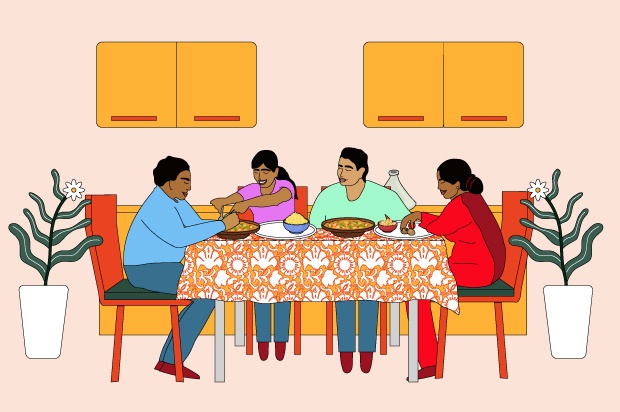Talking to first generation parents about racism

Hey! I’m Simran and I’m 24 years old. I work as a Marketing and Outreach officer at The Mix. I’m super passionate about giving young people a platform as well as raising awareness around issues centring the South Asian community.
Growing up with first generation immigrant parents in a strict Sikh and Punjabi household, you perceive the racist comments ‘casually’ thrown about by your family as something you can’t do anything about.
You start to think… how racist can they really be? Especially when living in a multicultural city. I mean I was raised in Southall, a district of West London that is majority South Asian.
It represents a place where, despite there being conflicts between our countries back home, we’ve learnt to set them aside and prioritise our existence as a collective seeking a better life, against the bigger fear of xenophobia from the White British.
Anti-blackness in the South Asian community
However, whilst chasing this dream of a better life, we’ve somehow found a way to define it and pursue it through actions that must show that we are everything the Black community is not. We use our proximity to whiteness to say: we are not like them. We are not Black.
This can be seen through the people we have chosen to idolise as a community e.g., Bollywood stars who see the endorsement of skin-whitening products as a right of passage and the constant derogatory use of the word kala (meaning black in Punjabi).
More recently, I was watching the news coverage of the Black Lives Matter protests with my dad and could not hold in my own anger at him as he got angry with the looting of local stores.
You’d think as someone who has experienced their own fair share of discrimination and outward xenophobia, he would support and understand.
After all, the Bristol Bus Company Boycott (1963), which was driven by the Black British community, was what led to Raghbir Singh (a Sikh) becoming Bristol’s first non-white bus conductor.
Learn more about how to be an ally to the Black Lives Matter movement here.
What dinner table?
Silence isn’t just complicity for white people, but also for non-black people of colour that are letting ‘casual’ racist remarks go unchecked. That includes the fake news your mum and aunties send you via WhatsApp.
Tackling racism within your family is always brought up as something that ‘you need to bring up at the dinner table.’ But what if there is no dinner table?
For many of us, there is no set ‘dinner time’ where the family is together in one space, open to conversation. It’s too busy being torn up across class (where at least one family member is out working until night), and gender (where the mother and daughters have to make sure all the men of the family are fed roti first).
Also, young people are normally not given much room to speak. As most of us have been brought up being told to ‘respect your elders’, where any disagreement with them is a sign of ungratefulness for all they have sacrificed for you.
They’ve coped with a different framework: put your head down and don’t get involved with anything.
But we can no longer be respectful of racism: don’t just accept that this is just how they are and that they will never understand.
Talk to them.
I’m no professional, but I am someone that has been trying to raise awareness amongst my parents for a long long time (maybe too long). But here is some advice from friends and research that helps.
Tips for talking to your first-gen parents about racism
Educate YOURSELF.
Talking to your first-gen immigrant parents about racism is not only about educating them.
It’s about educating yourself about their own relationship with racism, politics and the government in their home countries.
They themselves have most likely been subjected to racism throughout their lives and have their own stories about oppression.
The reason why my dad was so angered about stores being looted was because he worked every day of my life, until I was 23, to keep his own business running. I now understand where his anger came from and will try to be aware of that in future discussions with him.
Also, if your parents come from a country with colonial history, they have generations-worth of internalised racism where power, worth and beauty was attached to skin colour.
Understand your parent’s narratives and how they may still carry that with them. Use these to explain what the Black community has been going through for centuries.
Set your emotions aside. Except empathy.
Put your emotions aside when talking to them – remember that you are changing the worldview they have been surviving by.
Do not be condescending or undermine their intelligence and lived experience. For most of us, they did not have the same opportunities as us and worked hard to give us the education we have.
Don’t overcomplicate what you want to say. Break it down and make it accessible.
Ask questions.
Ask them questions – this will allow them to think deeper about where their thoughts come from. Why do you feel that way? What is it that is making you angry?
Keep talking.
You won’t be able to unroot generations of biases in one sitting. This will take a while. But don’t forget that there are many resources online to help, e.g., ask if they could watch a documentary with you.
Look after yourself.
Like I said, this will take a while. Just be aware of that and take baby steps. Some of the time, these discussions will lead to arguments and very high tensions. Take a break and resume another time.
Read Faith Kachikondo’s self-care guide for those experiencing racism.
Next Steps
- Chat about this subject on our Discussion Boards.
By Simran Atwal
Updated on 07-Mar-2023
No featured article














